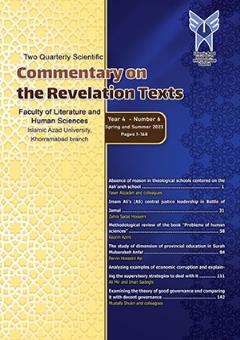Investigating rationalism in theological religions; Focusing on the Ash'are religion
Subject Areas : Theological and philosophical criticism of religious-Islamic subjectsYasir Alizadeh 1 * , hossein soleimani amoli 2 , abdollah rajaee litkohi 3
1 - PhD student of Islamic Philosophy and Theology, Babol Branch, Islamic Azad University, Babol, Iran
2 - Assistant Prof, Department of Islamic knowledge and philosophy, Faculty of Humanities, Babol Branch, Islamic Azad University, Babol, Iran
3 - Assistant Prof, Department of Islamic knowledge and philosophy, Faculty of Humanities, Babol Branch, Islamic Azad University, Babol, Iran
Keywords: Islam, Ash'ari, religious deviations, evasion of reason,
Abstract :
Reason and wisdom have an important place in religion and one of the key issues in the promotion and accurate, effective and deep understanding of religion is the recognition of religious deviations, irrationality and anti-rationalism in it. Since divine religions benefit from holy power and make everything related to it holy, it causes some people to pursue their non-religious goals in the name of religion and religiosity. This article tries to address the grounds of the formation of anti-rationalism with the conceptualization of religious deviations and rationalism and examine the results of religious deviations and rationalism in the Ash'ari school. The grounds for the formation of anti-rationalism have been created in some religious schools of thought, and it is believed that the decline of rationality in Islam has developed with the spread of Ash'ariism, and Ash'ari has become the cause of the backwardness of the Islamic world. The main goal of this article is to prevent the damage of irrationality in the society by removing distortions from the holy religion of Islam.
فولادوند، محمد مهدی (۱۳۷۶)؛ قرآن کریم، تهران: دارالقرآن الکریم
دشتی، محمد (۱۳۷۹)؛ نهج البلاغه، قم: مشهور
ابراهیمی دینانی، غلامحسین (1383)؛ منطق و معرفت از نظر غزالي، تهران: امیرکبیر.
ابن اثیر، عزالدین (1966)؛ الكامل في التاريخ، ج 6، تهران: المکتبة الاسلامیة
ابن خلدون، عبدالرحمن بن محمد (1360)؛ مقدمه ابن خلدون، ج 3، بیروت: دارالفکر.
ابن عساکر، علی بن الحسن (2001)؛ تاریخ دمشق الکبیر، بیروت: دار إحیاء التراث العربی
اقبال لاهوری، محمد (1362)؛ احیای فکر دینی در اسلام، تهران: شرکت سهامی انتشار
آسیموف، آیزاک ( 1347)؛ سرگذشت زیستشناسی، ترجمه محمود بهزاد، قم: دفتر تبلیغات اسلامی.
تاونی، ریچارد هنری (1377)؛ دین و ظهور سرمایه داری، ترجمه احمد خزاعی، تهران: مرکز
جوادی آملی، عبدالله (۱۳۸۱)، دین شناسی، چاپ اول، قم: اسراء
جوادی آملی، عبدالله (۱۳۸۶)؛ منزلت عقل در هندسه معرفت دینی، چاپ دوم؛ قم: اسراء.
حاجی خلیفه، مصطفی بن عبداللّه (1990)؛ کشف الظنون، ج۱، بیروت: دارالکتب العلمیة
حقیقت، سیدصادق (۱۳۸۹)؛ مبانی اندیشه سیاسی در اسلام، تهران: سمت
خمینی،سید روح الله (1387)، شرح فصوص الحكم، تهران؛ نشر علم
درایتى، مصطفى (1413)؛ معجم الفاظ غررالحکم، قم؛ مرکز الابحاث و الدراسات الاسلامیه.
رازی، فخرالدین (۱۹۸۶)؛ الاربعین فی اصول الدین، القاهرة: دارالسلام
روسو، پیر(1391)؛ تاریخ علوم، ترجمه حسن صفاری، تهران: امیرکبیر
سارتون، جرج (1943)؛ سرگذشت علم، ترجمه احمد بیرشک، تهران: انتشارات علمی و فرهنگی.
سهروردی، شهابالدین عمر بن محمد (1362)؛ کشف الفضائح الیونانیة، قاهره؛ دارالسلام.
صدرالدین محمد بن ابراهیم قوام شیرازی یا ملاصدرا (1398)؛ اسفار اربعة، تهران: نشر مولی.
طباطبایی، محمّدحسین (1417)؛ المیزان فی تفسیر القرآن، بیروت: مؤسسة الأعلمی للمطبوعات
عین القضات همدانی، عبدالله بن محمد (1401)؛ زبدة الحقايق، تهران: اساطیر.
قفطی، ابوالحسن علی بن یوسف (1371)؛ تاریخ الحکماء، تهران: دانشگاه تهران.
مارودی، ابواحسن (1399)؛ الأحكام السلطانية، ج 2، نجف اشرف: نشر بغداد.
مقریزی، احمد بن علی (1415)؛ الخطط المقریزیة، بیروت: دارالکتب العلمیة.
نصیرالدین طوسی، محمدبن محمد(۱۴٠۵)؛ مصارع المصارع، قم: کتابخانه آیت الله مرعشی
واعظی، علی (1385)؛ عقلگرایی انتقادی و نقد آن، مجله علمی کلام اسلامی، سال 15، شماره 59، صص 105-91

